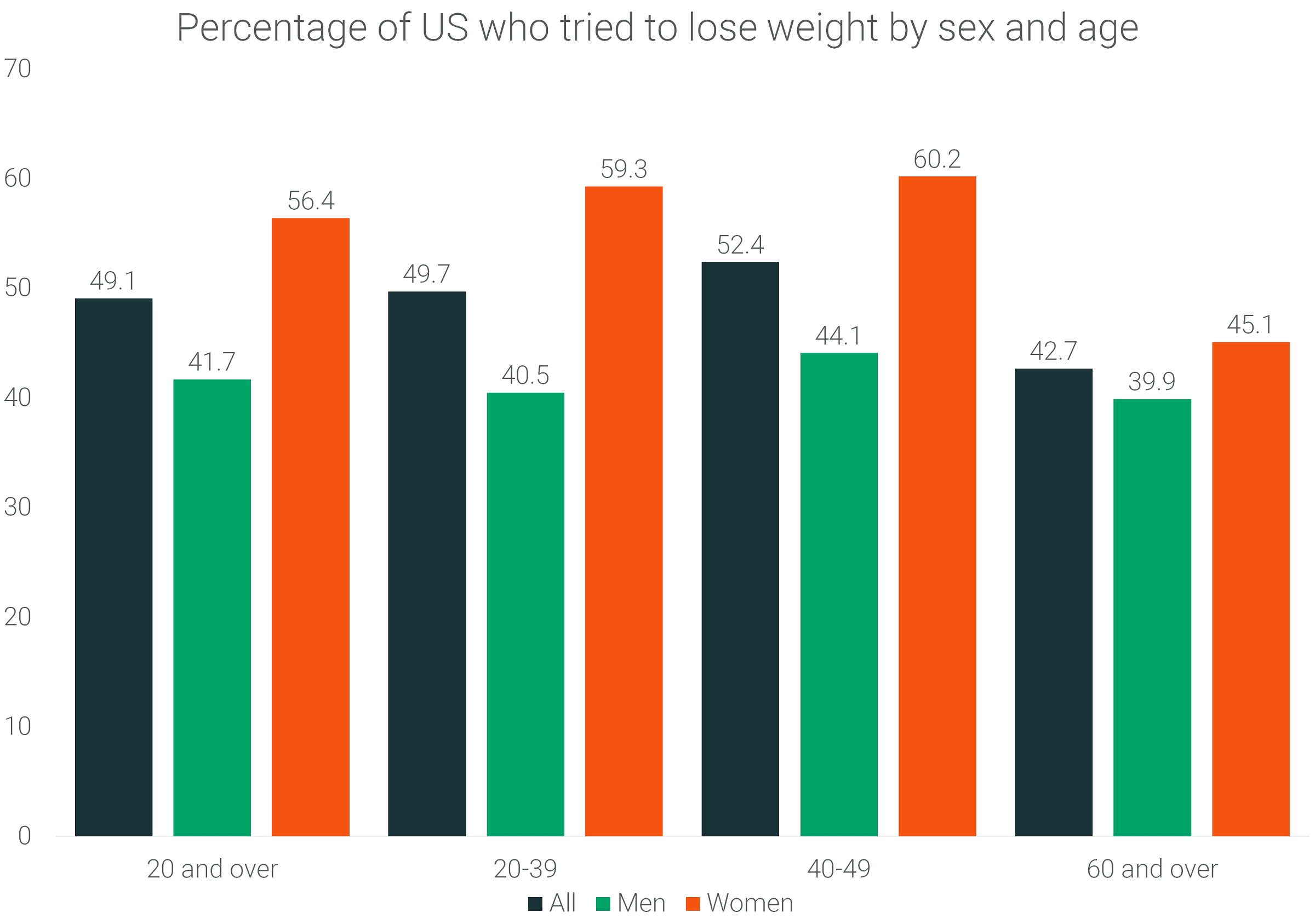Part
01
of one
Part
01
Overweight People - Demographics
Key Takeaways
- White adults (49.4%) are more motivated to lose weight compared to Hispanics (49.1%), Blacks (48%), and Asians (41.4%).
- About 61% of women are motivated to lose weight compared to 47% of men.
- For overweight men in the US, higher incomes are associated with a higher motivation to lose weight.
- Overweight people with an income 350% above the federal poverty level (FPL) in the US are more motivated to lose weight (53.7%) than those with incomes less than or equal to 350% FPL (48.7%) and less than or equal to 130% FPL (42.9%).
Introduction
This research provides the demographic profile of overweight individuals in the US who are motivated to lose weight. The demographic factors considered include age, race, gender, and income. Middle-aged white women earning over $30,000 are the most motivated to lose weight. Women's income does not significantly impact their motivation to lose weight. However, men in the highest income bracket are the most motivated to lose weight.
Due to data limitations, which are explained in detail in the Research Strategy section, we had to make some assumptions to create the demographic profile. Primarily, we assumed that since most of the US population is overweight (i.e., about 74%), data on all US people who are motivated to lose weight is representative of the group who is overweight and motivated to achieve it. More details on our logic can also be found in the Research Strategy section.
Age & Race
- US seniors aged 60 years and above are the least motivated to lose weight (42.7%), followed by adults between 20 and 39 years (49.7%).
- Middle-aged adults between 40 and 59 years were the most motivated to lose weight (52.4%).
- White adults (49.4%) were more motivated to lose weight compared to Hispanics (49.1%), Blacks (48%), and Asians (41.4%).
- For additional context, one systematic review of studies found that weight loss attempts are often less successful among African-American women than white women, though it is unclear how connected it is to differences in motivation.
Gender & Income
- About 61% of women are motivated to lose weight compared to 47% of men.
- Additionally, one study found that among people with a body mass index (BMI) of 35 or higher, 60% of women were attempting to lose weight, compared to 50% of men.
- About 63% of overweight women earning between $30,000-$74,999 are motivated to lose weight. However, 60% of women in the highest income bracket ($75,000 and above) are as motivated to lose weight as the lowest income bracket (less than $30,000).
- Higher incomes are associated with a higher motivation to lose weight among overweight men in the US. About 38% of men in households with annual income below $30,000 are less motivated to lose weight compared to 46% of those earning $30,000-$74,999 and 55% earning $75,000 and above.
- Overweight people with an income 350% above the federal poverty level (FPL) in the US are more motivated to lose weight (53.7%) than those with incomes less than or equal to 350% FPL (48.7%) and less than or equal to 130% FPL (42.9%).
- However, studies revealed that overweight people with household incomes between $20,000 and $40,000 were likely more successful in long-term weight loss (over one year) than those earning $75,000 and above.
- This conclusion was obtained from a US study that associated higher levels of long-term weight loss with reduced financial success.
Research Strategy
We leveraged reports from RunRepeat, Gallup News, and BMC Public Health to provide the requested information. However, we found that the available information on the topic was limited. We found that those surveys and reports typically don't differentiate between people who are overweight and healthy weight when assessing motivation to lose weight. Hence, we shifted our focus to academic studies. However, they typically included very small groups of participants and focused on specific weight loss interventions (such as this study published in the Frontiers of Public Health) and/or were limited in terms of demographic groups represented (such as the study published in Obesity Science Practice).
Since we were unable to find specific demographics for overweight people motivated to lose weight, we provided some general demographics regarding US adults motivated to lose weight considering that over two-thirds of the population (about 74%), as provided by the US Centers for Disease Control and Prevention, were overweight in 2020. Earlier statistics also revealed similar information, with 66.7% of the US adult population being obese in 2016. Subsequently, we assumed that providing general demographic information for adults seeking to lose weight would mostly represent data for the overweight population with a minimal representation of under or normal-weight individuals. Due to the significant data limitations, we leveraged reports beyond Wonder's typical two-year timeframe.


